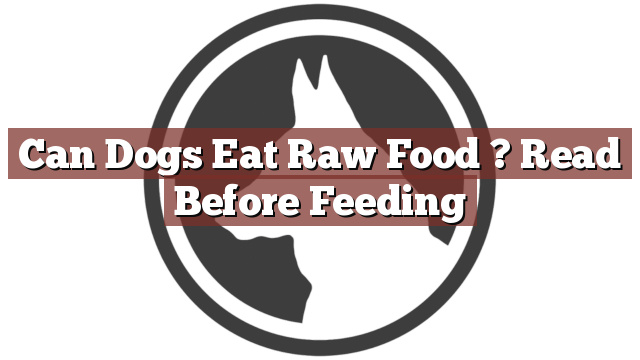Understanding Your Dog’s Dietary Needs
As responsible dog owners, it is crucial to understand the dietary needs of our furry friends. Just like humans, dogs require a balanced and nutritious diet to maintain optimal health and well-being. While commercial dog food is widely available and formulated to meet their nutritional requirements, some pet owners wonder if their dogs can eat raw food.
Can Dogs Eat Raw Food? Read Before Feeding
Can dogs eat raw food? This is a common question that many dog owners have. The answer is yes, dogs can eat raw food. In fact, a raw food diet for dogs has gained popularity in recent years. Advocates of the raw food diet argue that it is more natural for dogs, as their ancestors in the wild consumed raw meat. Proponents claim that feeding dogs raw food can lead to various health benefits, including improved digestion, healthier skin and coat, increased energy levels, and better dental health.
However, it is essential to note that not all raw foods are safe for dogs to consume. Raw meat, bones, and organs are suitable options for a raw food diet. However, certain raw food items, such as raw fish and eggs, can carry bacteria and parasites that may pose health risks to dogs. It is crucial to consult with a veterinarian or a pet nutritionist before incorporating raw food into your dog’s diet to ensure that it is safe and nutritionally balanced.
Pros and Cons of Feeding Raw Food to Dogs
Feeding raw food to dogs has its own set of pros and cons. Let’s take a look at some of the benefits and risks associated with a raw food diet for dogs:
Pros:
-
Improved Digestion: Raw food is generally easier for dogs to digest compared to heavily processed commercial dog food. It may help alleviate digestive issues such as bloating, gas, and diarrhea.
-
Healthier Skin and Coat: A raw food diet can contribute to healthier skin and a glossy coat in dogs. The natural oils present in raw meat can support skin health and promote a shiny coat.
-
Increased Energy Levels: Some proponents of raw food diets claim that dogs experience increased energy levels and improved overall vitality when fed raw food.
Cons:
-
Risk of Bacterial Contamination: Raw food, especially raw meat, carries the risk of bacterial contamination, such as Salmonella and E. coli. These pathogens can cause illness in dogs and may pose a risk to human family members as well.
-
Nutritional Imbalance: Without proper guidance and knowledge, it can be challenging to provide a nutritionally balanced raw food diet for dogs. It is crucial to ensure that dogs receive all the necessary nutrients, vitamins, and minerals to meet their dietary needs.
-
Potential Choking Hazard: Certain bones and larger pieces of raw meat can pose a choking hazard to dogs, especially those prone to gulping their food without chewing it properly.
In conclusion: Weighing the Benefits and Risks
In conclusion, while dogs can eat raw food, it is essential to consider the potential benefits and risks associated with a raw food diet. Before making any dietary changes for your dog, consult with a veterinarian or a pet nutritionist who can guide you on the best approach based on your dog’s individual needs and health condition. They can help you determine if a raw food diet is suitable and provide guidance on how to properly prepare and balance the diet to ensure your dog’s overall health and well-being. Remember, the health and happiness of your furry companion should always be the top priority.
Thank you for taking the time to read through our exploration of [page_title]. As every dog lover knows, our furry friends have unique dietary needs and responses, often varying from one canine to another. This is why it's paramount to approach any changes in their diet with caution and knowledge.
Before introducing any new treats or making alterations to your dog's diet based on our insights, it's crucial to consult with a veterinarian about [page_title]. Their expertise ensures that the choices you make are well-suited to your particular pet's health and well-being.
Even seemingly harmless foods can sometimes lead to allergic reactions or digestive issues, which is why monitoring your dog after introducing any new food item is essential.
The content provided here on [page_title] is crafted with care, thorough research, and a genuine love for dogs. Nevertheless, it serves as a general guideline and should not be considered a substitute for professional veterinary advice.
Always prioritize the expert insights of your veterinarian, and remember that the health and happiness of your furry companion come first.
May your journey with your pet continue to be filled with joy, love, and safe culinary adventures. Happy reading, and even happier snacking for your canine friend!

